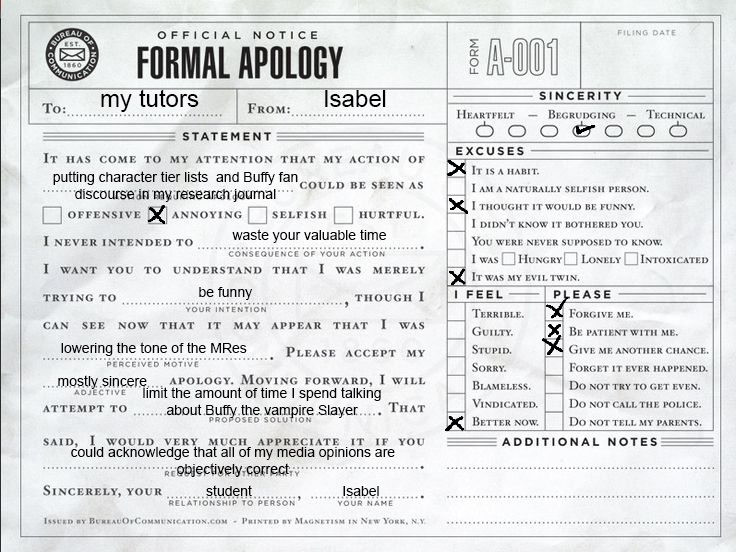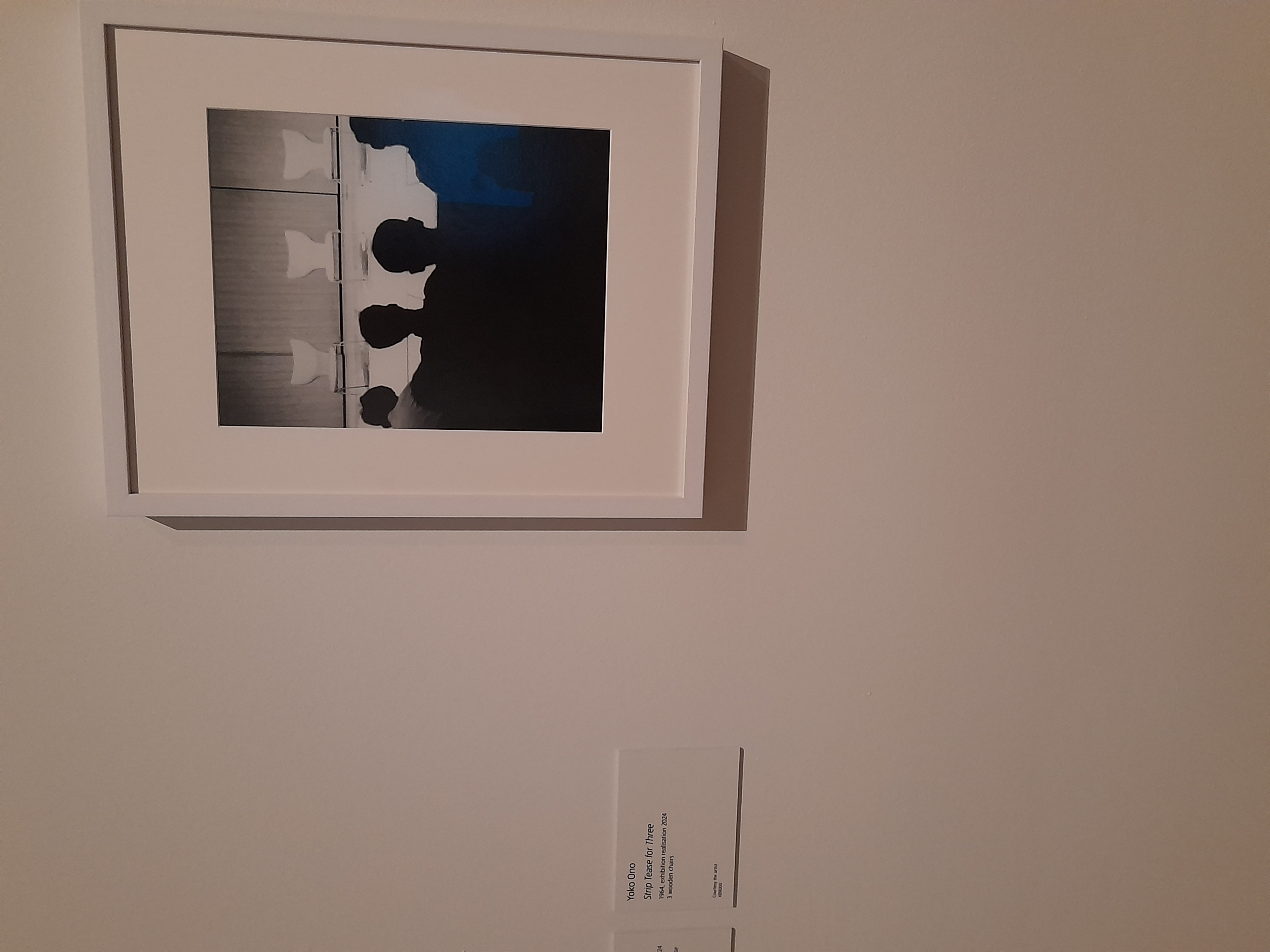



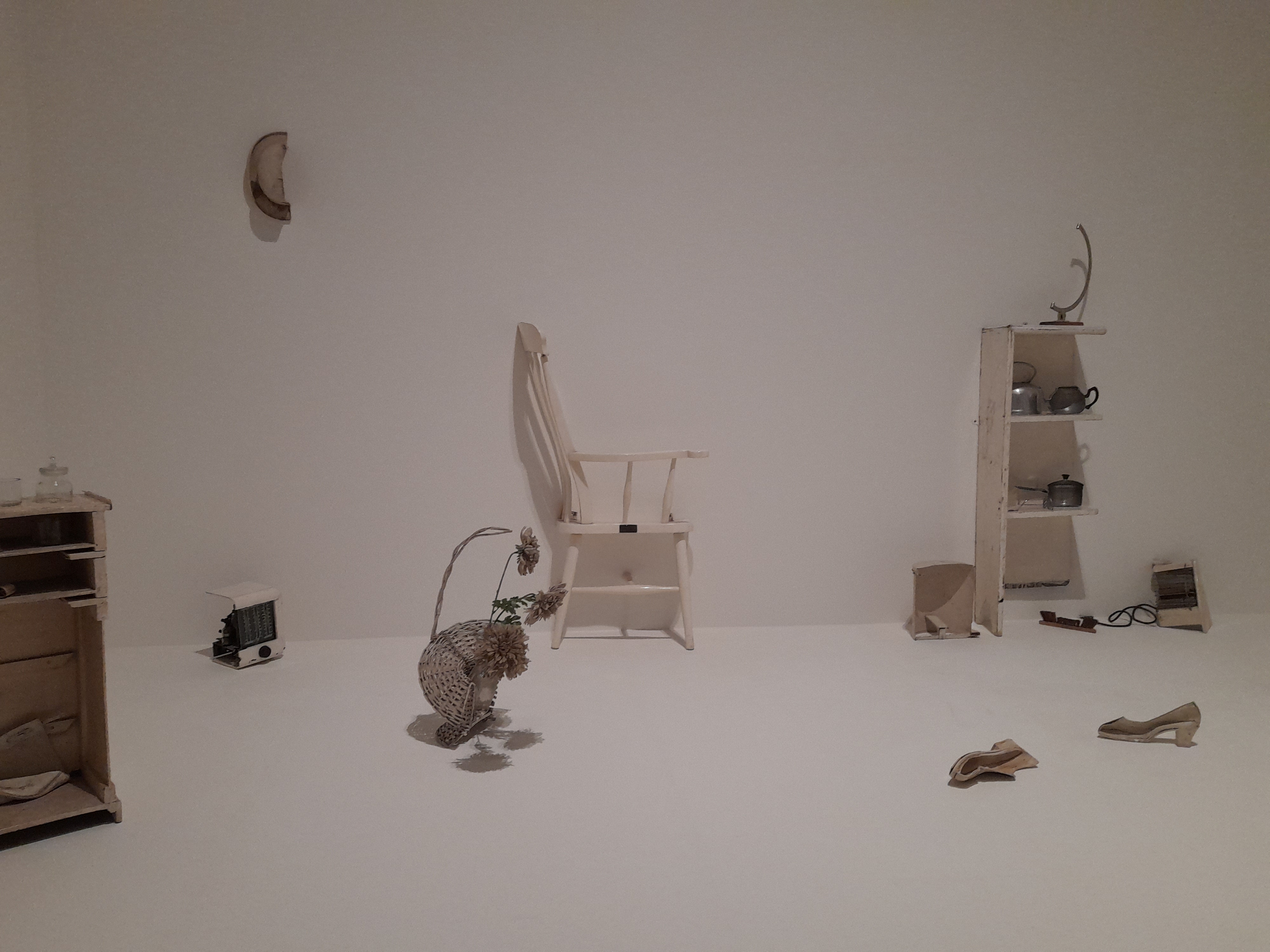
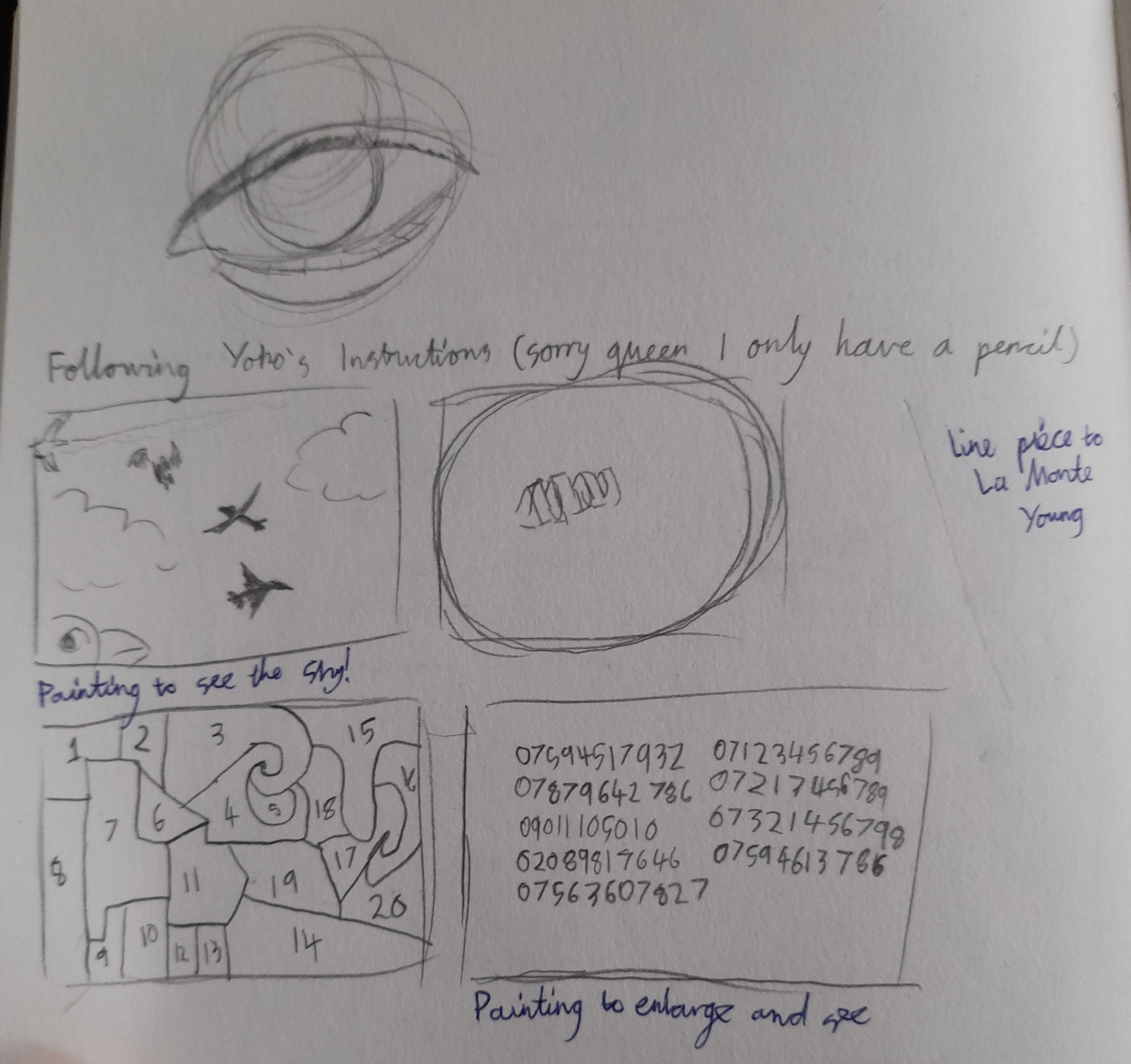
After getting distracted by the various books and shows I wanted to look at (though not as much as I planned to AAAAAAAAAAAAAAA. It's fine. It's so fine that I'm several weeks behind on my study plan), I have a tutorial tomorrow so I should probably actually put together some kind of plan for how I'm going to change my primary research plan from the EIRA!
The main feedback I got from Rebecca was:
The second point is fairly easy to deal with - while I have seen interview guidance that suggests some partcipants may want to not be anoymised so they can be credited for their contribution, I do think that Rebecca raised a good point that for such a sensitive study it would probably be best to keep the entire thing anonymous. I also talked to Louise about it, and they said that when they did their focus groups they didn't have the option to name any of the participants. Since our projects are quite similar, it would probably be worth taking the same approach.
The first point is more complicated. The main issue is whether it's worth offering the option for people to take part in individual interviews in addition to running the focus groups. Rebecca's feedback raised the concern that this would create too much work to be feasible, in addition to the fact that I could probably more reliably get people to attend a single focus group than attend two interviews AND watch screening content in between. (Not to mention, having the screening run solely by me means only I need to have access to whatever it is I want to screen.) ON THE OTHER HAND, people might be more likely to want to get involved if they know they have the option for it to be a one-to-one thing. Basically, there's a lot of factors to consider here, so it's time to go back to my go-to solution for any difficult decision I have in life: making a pros and cons list!
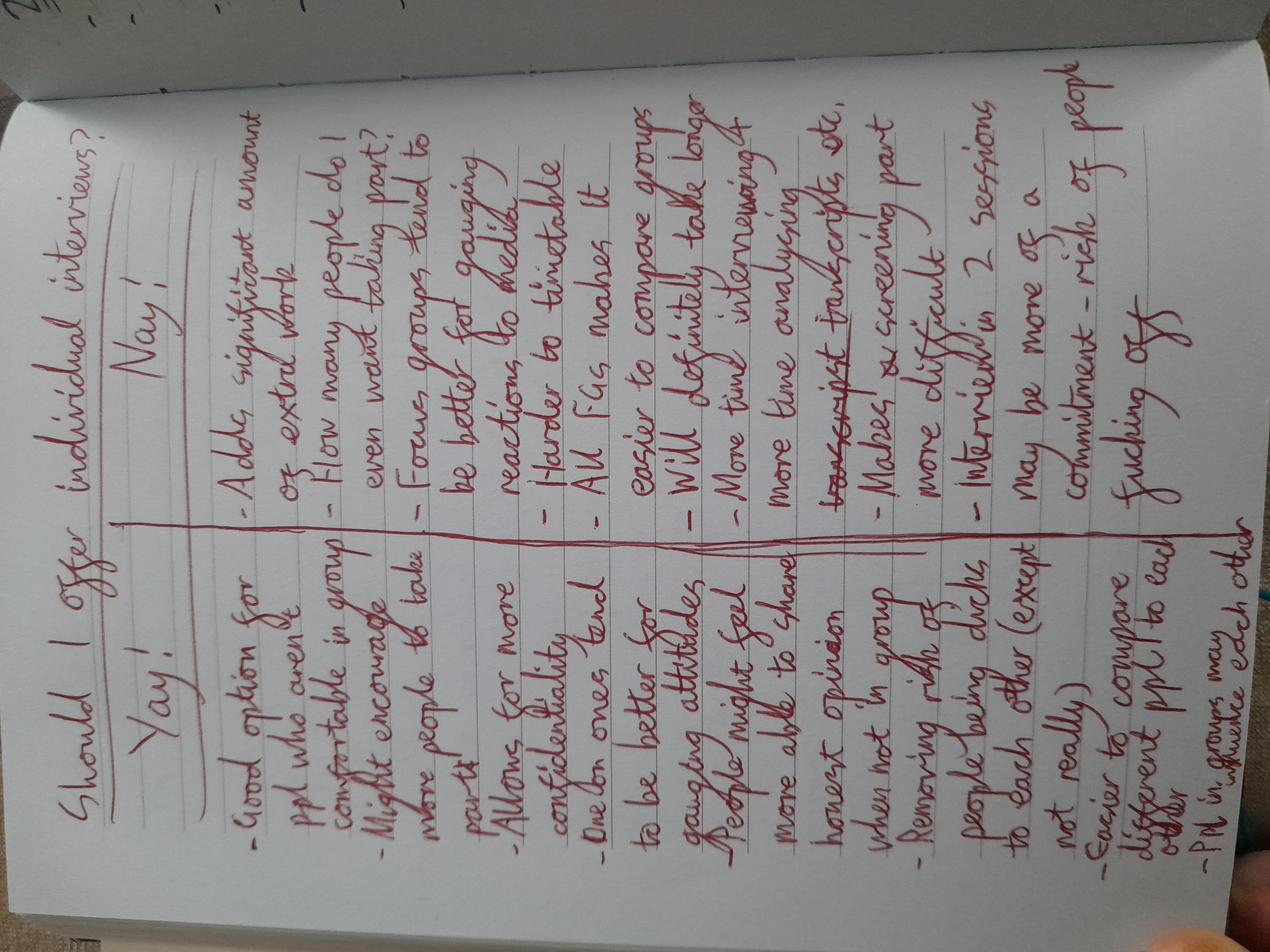
Other questions I need to answer before I write up the participant info sheet and such:
ALSO NOTE TO SELF THAT I NEED TO EMAIL CORIN ABOUT THOSE ARTICLES I WANT ACCESS TO. PLEASE DO THIS TODAY ISABEL
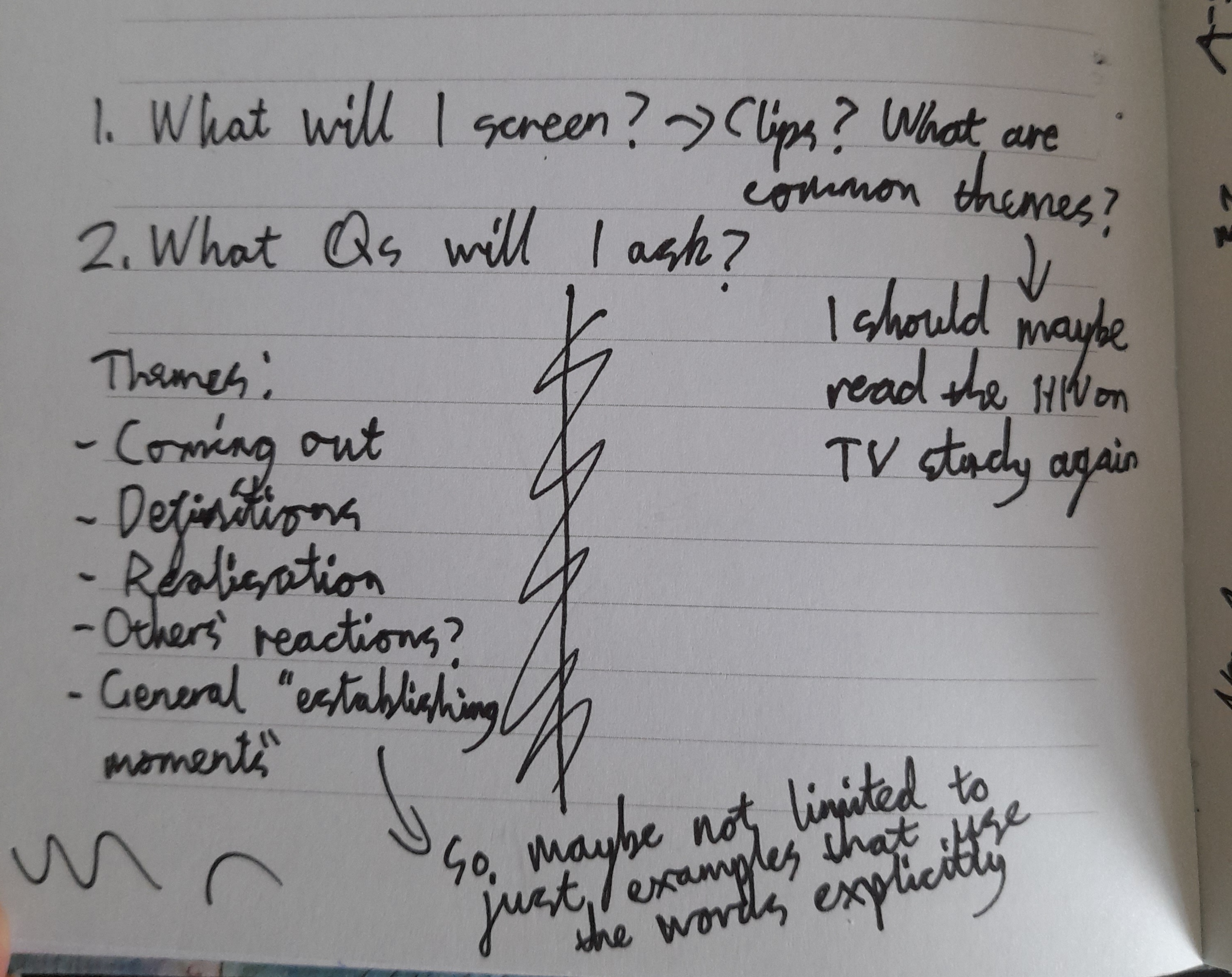
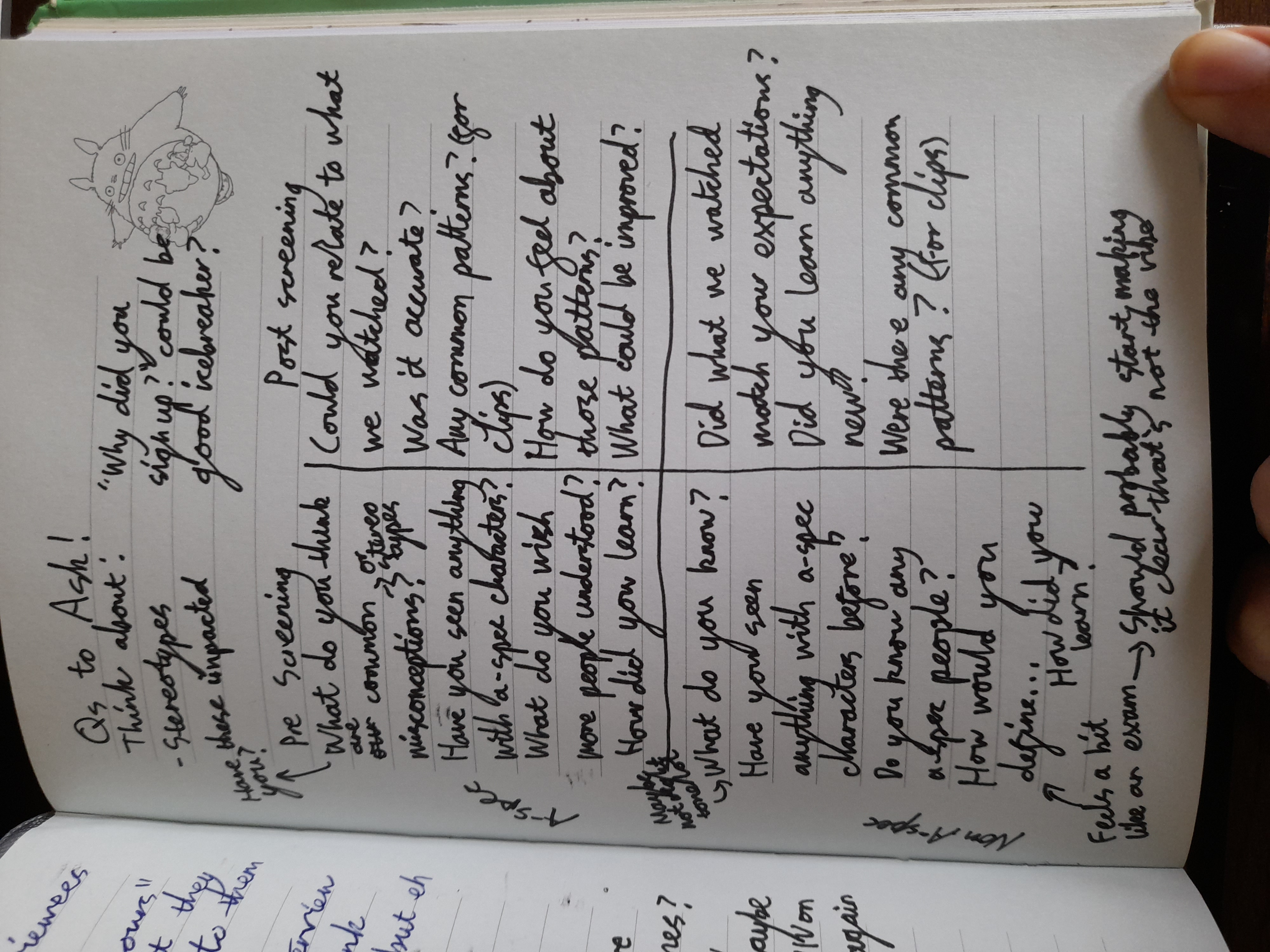
Had my second tutorial with Emma and Colin today (and actually remembered to show up for it on time!) - We discussed a whole lot of things but here are the headlines:
Basically, I feel like I now have a much clearer idea of my goal for this unit: determining my actual position in this research.
By our next tutorial, I want to have a clearer idea of where I'm positioning myself within feminist/TV studies, as well as a more concrete plan for the focus groups.
OK TO DO FOR THE WEEK:
Guys it's actually going so fine.
The other main event of the day was that I took part in the LGBTQ Human Library. It was a really interesting event and I enjoyed getting to meet my fellow human "books" (and some of them even expressed interest in taking part in my focus groups if they're around for them!) I didn't end up speaking to that many people, but it was nice to get to discuss my asexual and aromantic experiences publicly!
Diane, it's 12:52 on a Wednesday and as we speak I am invading BU library to raid their selection of TV studies books (this joke is funny because half the books in question reference Twin Peaks).
Books I've identified as being potentially useful are as follows:
Other books I've found that seem less relevant but I want to read anyway:
I started off by reading one of the Buffy essays: Monsters and Metaphors: Buffy the Vampire Slayer and the Old World by Mary Hammond in Cult Television. "Isabel, did you really read one of the essays about Buffy before reading anything that was actually relevant?" I hear you ask. Ok, yes, but also there's more stuff there that's relevant than you might expect I promise. Like I think how BtVS portrays sex and relationships is interesting. Joss Whedon demonstrably had issues.
Two points in particular that made my brain go brr: 1) The mention of "Buffy and her friends' dismissal of their Watcher as asexual" (p.154) - jumped out at me for obvious reasons even though I have frankly no idea if Mary realises that asexuality is an actual thing. Academic writing from the early 2000s is such a Russian roulette. I think it's not not worth thinking about though - it feels like it's drawing on the archetype of the character who's super intelligent and has no interest in relationships that I was talking about with Willem a few weeks ago (think your Sherlock Holmeses, your Miss Marples, your various other detectives!) Also it reminded me of the scene where Willow straight up thinks Giles doesn't know what sex is because he's a librarian. Genuinely I think that shit is comedy gold I love my stupid kids.
The other point that stuck out to me was some of the stuff they said about Angel and the season 2 Angelus arc (Likely thing for me to get hung up on considering it's my favourite arc in the show, even if it was probably influenced by whatever weird hangups about sex Joss Whedon has going on. Sue me. Also am I allowed to slander Joss Whedon this badly in my research journal? He's in public disgrace so I feel like it's fine right?) The point they make about Angel's status as an immigrant was very fascinating to me - it's genuinley a perspective I've never thought about that arc from: "A dangerous immigrant, Angel embodies a whole series of cultural anxieties: not just 'sex is bad,' but the repressed evil of European decadence returning to tempt young America; the fluidity of immigrant identity and the mutability of borders [...] the demon of sexual desire transmissible from a monster male to a pure female [PUT A PIN IN THIS POINT]; the torment of moral chocie and the temptation of surrendering to the wrong choice" (p.157)
Backing up a second to provide some context to the various points about sex for those of you haven't watched season 2 of Buffy the Vampire Slayer (which I'm officially now getting on my soapbox and recommending I guess. Absolutely seminal TV): This is all part of Mary's broader argument that "No one in [the show's] universe - as in the classic horror film - gets laid for free" (p.156), which as a fan of the show I would have to agree with. Basically no one's making it out of BtVS in a happy relationship. Mary summarises the whole Buffy and Angel Thing as such: "Buffy spends several episodes trying to come to terms with the dark side of Angel while fighting other demons, but finally gives in and loses her virginity to him on her seventeenth birthday ('Becoming, Part 2') [SIC. EXTREMELY LOUD INCORRECT BUZZER. IT HAPPENED IN 'SURPRISE'], not knowing that this will break the curse that makes him half-human, destroy his soul, and turn him into the classic Insensitive Male After Sex, complete with the line 'Love ya too. I'll call ya' ('Innocence')" (p.156). And like. Yeah I GUESS that's technically what happened but I'd like to take issue with the framing for a second. Firstly, the "gives in" framing feels so weird and gross I felt like I wanted to throw up while typing that up. It's here that I'd like to take the pin out of the "sexual desire transmissible from a monster male to a pure female" point because I feel like these two phrases really combine into the problem I have with this argument which is: Why are we pretending like Buffy had no agency in this episode and gets corrupted by Angel? Especially when Innocence explicitly rejects the idea that Buffy has been corrupted by having sex like that's what the bit where her mum says "I was going to say you look the same" (rough paraphrse it's been a second since I saw this episode) is about? I mean we can talk about the power dynamics in this relationship (which by the way this essay doesn't even seem to really be aware of PUT A PIN IN THIS TOO) but this isn't something Buffy "gives in" to it's a choice that she makes - at the beginning of the episode she's already like "Yeah I think I'm going to have sex with my boyfriend soon" - and I think you can absolutely criticise the show for the way it seems to punish her for that but like it's still HER choice!!
My other issue with it is that for an essay called "Monsters and Metaphors" it seems to completely miss the central metaphor of the season, which is Angel/Angelus as Buffy's abusive boyfriend, as the alluring older guy who seems nice and perfect at first but becomes a different person the closer Buffy gets to him. He doesn't just become "insensitive" after he loses his soul he becomes cruel and sadistic and obsessed with destroying Buffy's life and eventually killing her. And the show isn't even particularly subtle about the abusive ex-boyfriend thing like there's a lot of scenes after Angel loses his soul of Buffy's friends telling her that "he's not the guy you thought you knew" and stuff like that. And I think this is why it bothers me when analysis takes such an uncharitable approach to this arc. Like especially at the time Buffy was airing we were very much in a cultural landscape where "teenage girl in a relationship with an older man" is (to use a Folding Ideas-ism) treated as both setup and punchline. Like this is a weird example but the movie Mean Girls (which came out a year after BtVS finished airing) makes a joke out of teacher-student relationships and makes it about how the teenage girls in question are "too promiscuous" and I feel like that's very representative of the culture of the time. And I think it Means Something that Buffy season 2 looks at that experience and has empathy for teenage girls and takes their experiences seriously and says "No this isn't a joke. This is horrible and terrifying and it feels like a nightmare and it feels like someone you love has become a monster and it isn't because you did something wrong". I DON'T KNOW I JUST THINK IT'S CULTURALLY VALUABLE FOR THAT TO EXIST EVEN IF IT'S EXECUTED A BIT PROBLEMATICALLY. SORRY EVERYONE.
MOVING ON TO MORE RELEVANT THINGS - Notes from The man from ISIS: Archer and the animated aesthetics of adult cartoons by Holly Randell-Moon and Arthur J. Randell:
In addition to the TV studies stuff, I've also been reading some more of Lizzy B:
AND THEN I HAD TO STOP READING BRAKE TO GO TO THE AIRPORT AND CATCH A PLANE TO BARCELONA
Well, we had a good run with watching good TV shows. I actually watched at least one episode of three different shows this week, and most of them were not very good. One was not good in a fun way, while the other was mostly not good in a very frustrating and annoying way.
I had to change up my original plan for this week - I'd been planning to watch season 2 of Heartstopper this week, but since I was quite behind on my reading and focus group planning, I decided it would be better to switch that with the "one-off episodes week" I was gonna do next week, giving myself more time to get into the TV studies stuff. I started off watching season 2 episode 10 of the show Shadowhunters, which features a main (?) character revealing himself to be (presumably) asexual. They don't actually use the word 'asexual' in the show, but the author of the books the show is based on has described the character as asexual on social media, and the implications of the episode are pretty obvious.
When I say obvious, I mostly mean that Shadowhunters is not winning any points in the gracefulness category. The asexuality stuff consists of one bit of dialogue between the character (Raphael) and his girlfriend where, sort of out of the blue, he tells her "oh by the way I'm not interested in sex". They then immediately move on to talking about something else, this conversation never gets brought up again in the episode, and by the end of the episode the two of them have broken up for unrelated reasons so it truly feels completely irrelevant to anything else. It was not well done, but honestly I thought it was kind of camp. As a well-established fan of trashy teen shows I might have even been tempted to watch the rest of the show if the love triangle stuff at the end of the episode hadn't given me war flashbacks to all the times Angel the Series tried to make me care about men being jealous over women and completely put me off.
So that was quite funny, but after that I got distracted from the other one-off episodes I was meant to be watching because I decided to watch the popular new animated series Hazbin Hotel. This proved to be a mistake for several reasons. The show does have a character, Alastor, who the creator has confirmed as aromantic and asexual on social media, but aside from one slightly oblique line it's basically not brought up in the show. Honestly, under other circumstances I probably wouldn't have even bothered with watching it, but since it's a very recent release that's also very popular and in the zeitgeist at the moment (and also I want my Saturday Art School students to know I understand their interests) I decided to give it a shot. I didn't like it very much. By the end of the show it had kind of evolved into a "this really isn't my thing but I suppose I can see the appeal" situation, but dear god the opening three episodes were actually unbearable. We need to put an end to the plague of adult cartoons trying way too hard to be edgy instead of making an actual good show. Also I found the art style quite obnoxious. Also why were the songs so weirdly used. Not to sound like someone who wrote their dissertation about animated musicals but this show's understanding of musical structure is baffling to me. Anyway Alastor sure is there I guess.
Thankfully, I really turned things around right at the end of the week watching Legends of Tomorrow, a sci-fi show about a team of time travellers. I only watched the episode where the character Spooner realises she's asexual, but honestly I think I'm gonna end up watching the whole show just for fun. This episode hooked me in. The premise of it is that the team of time travellers are trying to prevent the assassination of Archduke Ferdinand so they can attract the attention of the evil AI that's taken over their timeship, but find that there are hundreds of other time travellers also trying to prevent the assassination, who are all hanging out at an interdimensional pub called The Fixed Point. It's genuinely quite incredible. Anyway I don't have much to say about the asexuality stuff - it was kind of just a basic "realisation" scene, though I do kind of like the concept of the ace character being from the past and learning about asexuality from a fellow time traveller from the future. That's kind of a fun idea, though I'm also not 100% sure Spooner is actually from the past. She seems like she is, but also this was the tenth episode of the seventh season so trying to figure out what the hell the lore was felt like trying to solve two billion rubik's cubes at once.
Transcripts for all these shows are here!
Anyway, the most important result of my research this week is that I tier listed all the aro/ace characters I've seen on TV so far (and also some guys from audio drama podcasts who I wanted to throw in)
.png)
I made this before I watched the Legends of Tomorrow episode but for the record if I were to add Spooner I'd probably put her in mid, with potential to move up to a thumbs up depending on how I end up finding the rest of the show.
Also stating here for the record that I did intend to watch the one episode of Everything's Gonna Be Okay that deals with asexuality but then I couldn't track it down anywhere so. That was a bust.






